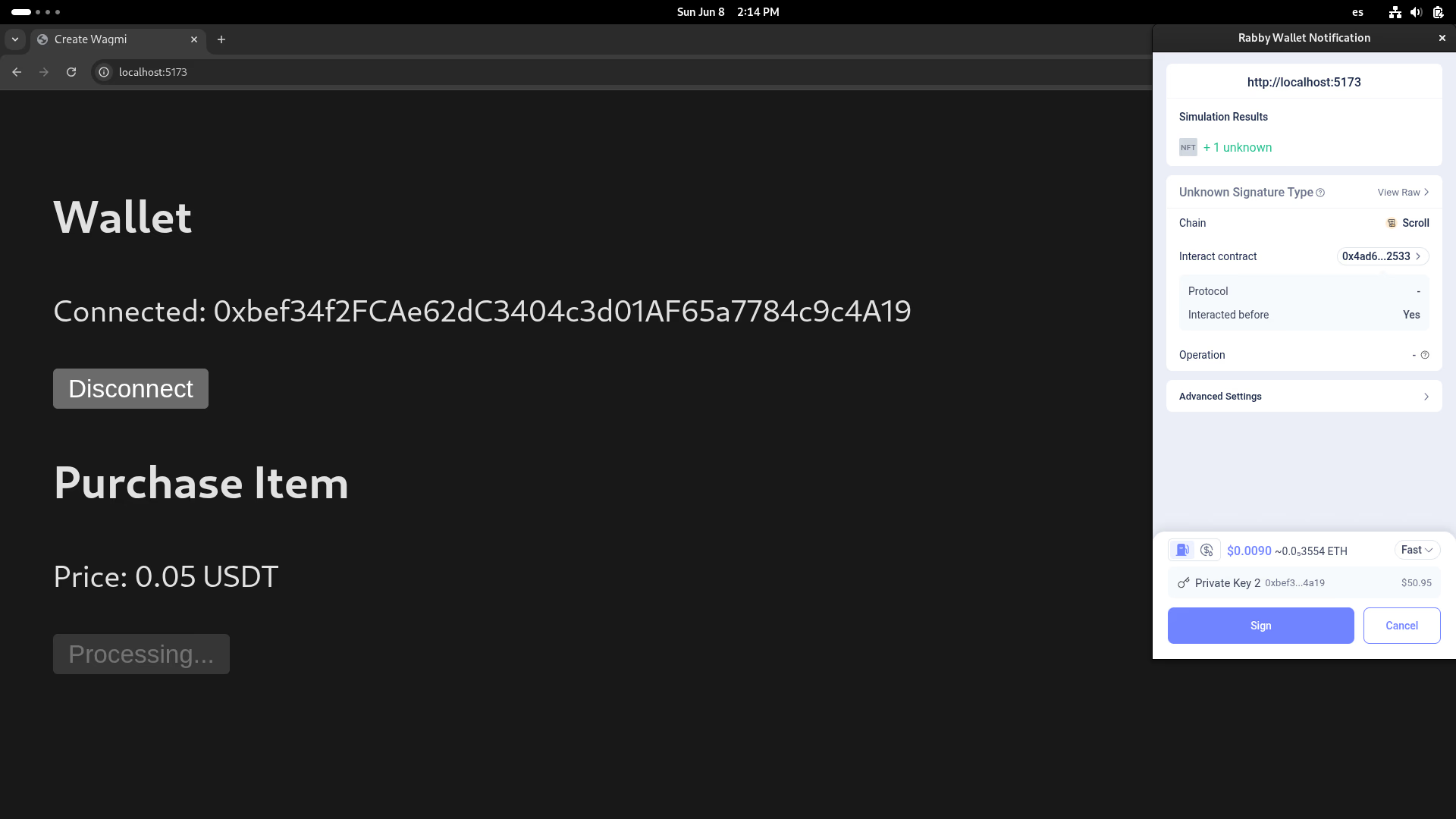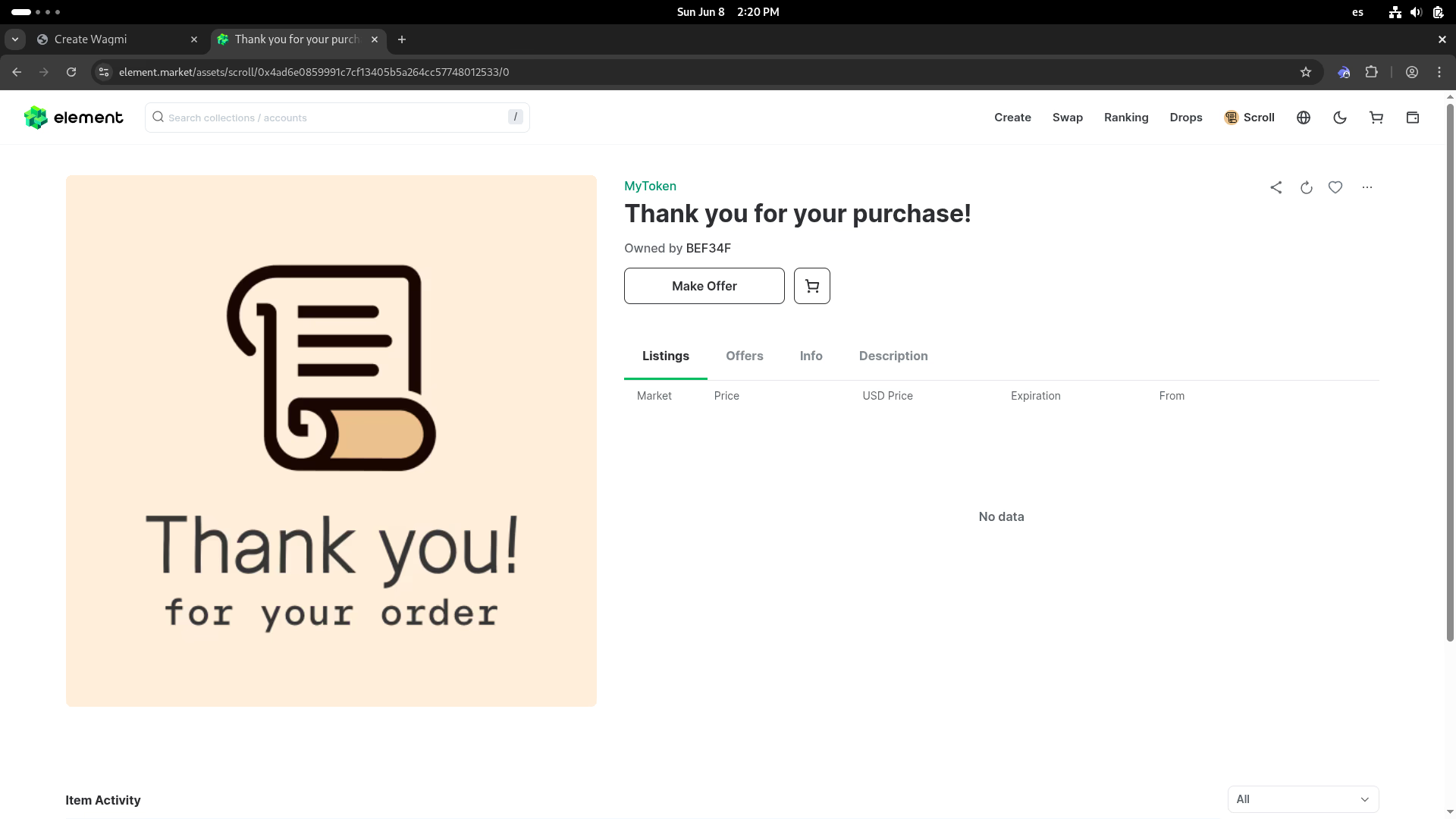Stablecoin Payments Tutorial
Welcome to the Scroll Stablecoin Payments Tutorial. This guide walks you through building a dApp that processes USDT payments and mints NFTs as receipts, from smart contract development to frontend integration.
What You’ll Build
By the time you’re done, you’ll have:
- Deployed a PaymentProcessor smart contract that handles USDT payments
- Created a React frontend that enables users to approve and make payments
- Implemented NFT minting as payment receipts
- Connected everything to Scroll’s network

What you’ll build: a payments app that processes USDT payments and mints NFTs as recipts.
If you run into any issues, please reach out in our Discord.
Install and Configure Foundry
We’ll use Foundry to compile and deploy our PaymentProcessor contract.
Create a folder for the contract:
# create a new contracts directorymkdir contractscd contracts# install and update foundry if you haven'tcurl -L https://foundry.paradigm.xyz | bashfoundryup# initialize a fresh Foundry projectforge init --no-git# install openzeppelin contractsnpm install @openzeppelin/contractsConfigure Contract Dependencies
Create a remappings.txt file to help Foundry locate the OpenZeppelin contracts:
remappings.txt
openzeppelin-contracts/=node_modules/@openzeppelin/contracts/src/PaymentProcessor.sol
// SPDX-License-Identifier: MIT// Compatible with OpenZeppelin Contracts ^5.0.0pragma solidity ^0.8.27;
import {ERC721} from "openzeppelin-contracts/token/ERC721/ERC721.sol";import {IERC20} from "openzeppelin-contracts/token/ERC20/IERC20.sol";
// The following contract will process payments from users by debiting the item price and minting an NFT as reciptcontract PaymentProcessor is ERC721 { // Internal NFT counter for ID generation uint _nextTokenId; // NFT metadata url for our demo string _tokenURI = "https://raw.githubusercontent.com/Turupawn/erc721-nft-metadata-demo/refs/heads/main/metadata.json"; // Set to the contract deployer, will receive each USDT payment address public STORE_OWNER; // USDT token address in mainnet address public PAYMENT_TOKEN = 0xf55BEC9cafDbE8730f096Aa55dad6D22d44099Df; // USDT uses 6 decimals, adapt accordingly if you use other token uint8 PAYMENT_TOKEN_DECIMALS = 6; // Item price will cost 0.05 USDT using the formula based on decimal amount uint public ITEM_PRICE = 5 * 10**PAYMENT_TOKEN_DECIMALS / 100;
constructor() ERC721("MyToken", "MTK") { STORE_OWNER = msg.sender; }
// During puchase, the item price will be debited from the user and transfered to the shop owner function processPurchase() public { uint tokenId = _nextTokenId++; _safeMint(msg.sender, tokenId); IERC20(PAYMENT_TOKEN).transferFrom(msg.sender, address(this), ITEM_PRICE); IERC20(PAYMENT_TOKEN).transfer(STORE_OWNER, ITEM_PRICE); }
// Even though in our demo each item has the same metadata we still follow the ERC721 standard function tokenURI(uint tokenId) public view override(ERC721) returns (string memory) { tokenId; return _tokenURI; }}Deploy the Smart Contract
Set your environment variables:
.env
SCROLL_RPC_URL="https://rpc.scroll.io/"PRIVATE_KEY=<YOUR_PRIVATE_KEY>Deploy with Foundry:
source .envforge create src/PaymentProcessor.sol:PaymentProcessor \ --rpc-url $SCROLL_RPC_URL \ --broadcast \ --private-key $PRIVATE_KEYYou should see output confirming the deployer address, contract address, and transaction hash. Save the contract address under Deployed to:, you’ll need it when configuring the frontend.
[⠊] Compiling...No files changed, compilation skippedDeployer: 0xbef34f2FCAe62dC3404c3d01AF65a7784c9c4A19Deployed to: 0xf0e9ceCAE516B2F5Ac297B3857453b07455f817FTransaction hash: 0x2bca5934ad82ce26332847fdd6a9241b0da0e38e6928f06499ee58ebc967bbdeCreate and Configure the React Frontend
Scaffold a React app with Vite, wagmi, and Viem:
cd ..pnpm create wagmi frontend -t vite-reactcd frontendpnpm installAdd your deployed contract address to .env.local:
env.local
VITE_PAYMENT_PROCESSOR_ADDRESS=0xYourNewContractAddressImplement the Frontend Logic
Create a new payments component on src/components/Payments.tsx:
src/components/Payments.tsx
import { useAccount, useWriteContract } from 'wagmi'import { createPublicClient, http } from 'viem'import { scroll } from 'viem/chains'import { useState, useEffect } from 'react'
const PAYMENT_PROCESSOR_ADDRESS = import.meta.env.VITE_PAYMENT_PROCESSOR_ADDRESS as `0x${string}`const USDT_ADDRESS = '0xf55BEC9cafDbE8730f096Aa55dad6D22d44099Df'
// Connect your webapp to Scroll Mainnetconst publicClient = createPublicClient({ chain: scroll, transport: http()})
// ABI that allows connecting to our payments smart contractconst paymentProcessorABI = [ { inputs: [], name: "processPurchase", outputs: [], stateMutability: "nonpayable", type: "function", }, { inputs: [], name: "ITEM_PRICE", outputs: [{ type: "uint256" }], stateMutability: "view", type: "function", },] as const
// ERC20 ABI to be able to send USDT to our smart contractconst usdtABI = [ { inputs: [ { name: "spender", type: "address" }, { name: "amount", type: "uint256" } ], name: "approve", outputs: [{ type: "bool" }], stateMutability: "nonpayable", type: "function", }, { inputs: [ { name: "owner", type: "address" }, { name: "spender", type: "address" } ], name: "allowance", outputs: [{ type: "uint256" }], stateMutability: "view", type: "function", },] as const
// Custom hook for payment functionalityfunction usePayment() { const { address } = useAccount() const [itemPrice, setItemPrice] = useState<bigint | null>(null) const [allowance, setAllowance] = useState<bigint | null>(null) const { writeContract: writePaymentProcessor, isPending: isProcessing } = useWriteContract() const { writeContract: writeUSDT, isPending: isApproving } = useWriteContract()
// Fetches the price of the item set on the smart contract: 0.05 USDT const fetchItemPrice = async () => { try { const result = await publicClient.readContract({ address: PAYMENT_PROCESSOR_ADDRESS, abi: paymentProcessorABI, functionName: 'ITEM_PRICE', }) setItemPrice(result) } catch (error) { console.error('Error reading item price:', error) } }
// Check if the user already approved the smart contract const fetchAllowance = async () => { if (!address) return try { const result = await publicClient.readContract({ address: USDT_ADDRESS, abi: usdtABI, functionName: 'allowance', args: [address, PAYMENT_PROCESSOR_ADDRESS], }) setAllowance(result) } catch (error) { console.error('Error reading allowance:', error) } }
useEffect(() => { fetchItemPrice() fetchAllowance() }, [address])
// Approves USDT to be sent to our smart contract const approveUSDT = () => { if (!itemPrice) return writeUSDT({ address: USDT_ADDRESS, abi: usdtABI, functionName: 'approve', args: [PAYMENT_PROCESSOR_ADDRESS, itemPrice], }, { onSuccess: (txHash) => { publicClient.waitForTransactionReceipt({ hash: txHash }) .then(() => fetchAllowance()) .catch(console.error) }, }) }
// Process the payment const processPurchase = () => { writePaymentProcessor({ address: PAYMENT_PROCESSOR_ADDRESS, abi: paymentProcessorABI, functionName: 'processPurchase', }, { onSuccess: (txHash) => { publicClient.waitForTransactionReceipt({ hash: txHash }) .then(() => fetchAllowance()) .catch(console.error) }, }) }
return { itemPrice, allowance, isProcessing, isApproving, approveUSDT, processPurchase, refreshAllowance: fetchAllowance }}
// Payment Componentexport function Payments() { const account = useAccount() const { itemPrice, allowance, isProcessing, isApproving, approveUSDT, processPurchase } = usePayment()
const needsApproval = allowance !== null && itemPrice !== null && allowance < itemPrice
// Displays either the approval or purchase button depending on the state return ( <div style={{ marginTop: '20px' }}> <h2>Purchase Item</h2> <p>Price: {itemPrice ? Number(itemPrice) / 1e6 : '...'} USDT</p> {account.status === 'connected' && ( <> {needsApproval ? ( <button onClick={approveUSDT} disabled={isApproving} > {isApproving ? 'Approving...' : 'Approve USDT'} </button> ) : ( <button onClick={processPurchase} disabled={isProcessing} > {isProcessing ? 'Processing...' : 'Purchase Item'} </button> )} </> )} </div> )}Add that component to your app:
src/App.tsx
import { useAccount, useConnect, useDisconnect } from 'wagmi'// Add your new Payments componentimport { Payments } from './components/Payments'
function App() { const account = useAccount() const { connectors, connect, error } = useConnect() const { disconnect } = useDisconnect()
return ( <div style={{ padding: '20px' }}> <div> <h2>Wallet</h2> {account.status === 'connected' ? ( <> <p>Connected: {account.addresses?.[0]}</p> <button onClick={() => disconnect()}>Disconnect</button> </> ) : ( <> {connectors.map((connector) => ( <button key={connector.uid} onClick={() => connect({ connector })} style={{ marginRight: '10px' }} > Connect {connector.name} </button> ))} {error && <p style={{ color: 'red' }}>{error.message}</p>} </> )} </div> // Render your new Payments component <Payments /> </div> )}
export default AppStart the Frontend
pnpm run devOpen your browser at http://localhost:5173. Connect your wallet, approve USDT, and make a purchase to see your NFT receipt on any marketplace that supports Scroll, such as Element.
